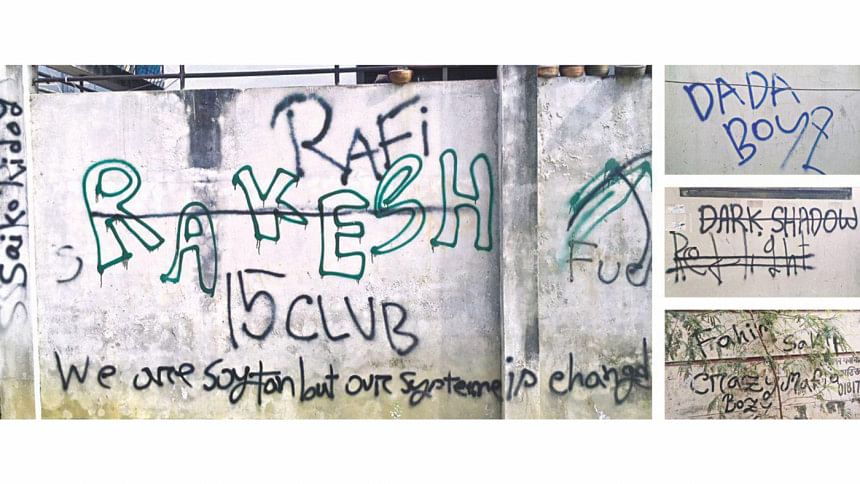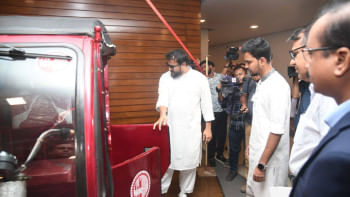Teen Gang Culture: Too dangerous to be ignored

From petty crimes to murder, stalking to rape, mugging to drug abuse -- teen gangs have been making headlines again for the last few months.
These gangs are often backed by a section of ruling party leaders, who act as the influential "elder brothers".
Most of the gang members trade and abuse drugs, while some have illegal firearms and local weapons to show-off their strength. The gangs often engage in turf-war over trifles.
Over a dozen people have reportedly been killed in the last four months by juvenile suspects.
Criminologists fear that it will be difficult to rehabilitate the gang members to normal life.
In a monthly crime review meeting on October 18, Dhaka Metropolitan Police Commissioner Md Shafiqul Islam asked police to be vigilant against teen gangs in Dhaka.
The commissioner asked the DMP's crimes unit to handle the issue with caution and urged beat policemen to identify the gangs and keep them under watch.
He also said there should be temporary checkposts across Dhaka to combat gang activities.
Teen gangs in the capital first hit the headlines after 14-year-old school student Adnan Kabir was beaten to death in Uttara by boys about his age in 2017.
There were over a dozen gangs in Uttara alone, law enforcers found.
In Savar, schoolgirl Nila Roy was murdered in September by the teenage member of a local gang, allegedly backed by two sons of a ruling party leader.
On October 9, a teenager named Nayeem was stabbed to death during a clash between two gangs in Fatullah, Narayanganj.
Earlier on April 1 in the same area, 30-year-old Sharif Hossain was hacked to death for protesting gang activities.
On August 10, two boys died after they jumped into the Shitalakhya in Bandar area of the district, apparently to get away from a pack of chasing teenagers.
Law enforcers say there are over 40 teen gangs with about 15-20 members in each.
They operate in areas including Uttara, Turag, Khilgaon, Dakshin Khan, Tongi, Sutrapur, Demra, Sabujbagh, Khilkhet, Kotwali, Mirpur, Mohammadpur, Dhanmondi, Agargoan and Hatirjheel, according to law enforcers.
The notorious Nayan Bond's 007 group in Barguna, which killed Rifat Sharif in broad daylight last year, is a glaring example of the youth gang culture, criminologists say. The gang was reportedly backed by the son of a top local Awami League leader.
A Barguna court sentenced 11 juveniles to prison for the murder, observing that juvenile crimes were on the rise across the country and godfathers were using children. Unless the accused are awarded the highest punishment, other teen gangs will get encouragement, the court said.
The gang-rape in Noakhali's Begumganj that shocked the nation recently was committed by a youth gang named Delwar Bahini. In Begumganj alone, at least two dozen such gangs operate with blessings from some ruling party leaders, according to reports.
RULING PARTY LEADERS PATRONISE
On August 28, college student Md Sohag was killed in Uttara khan area in Dhaka. It was learnt that he had protested when they assaulted a rickshaw-puller.
According to police and locals, the gang is led by Uttara East Chhatra League leaders Sakibul Islam Sunny, cultural affairs secretary of the unit, and his elder brother Arfin Shakil, vice-president of the unit.
Sunny is one of the accused in Sohag murder case.
The siblings were suspended recently from the posts.
Few months ago, Tiktok and Likee celebrity Yasin Arafat alias Opu Bhai got arrested after alleged his followers stabbed and beat up three local youths in Uttara. Locals alleged that this group was also patronised by the two brothers.
They alleged the gang patronised by Shakil and Sunny has been creating terror and involved in various criminal activities in Uttara and Abdullahpur areas for the last several years. At least six cases in Dakshin Khan and Uttara East police stations have been filed against the two brothers since 2016 on charges of murder, attempted murder and possession of narcotics.
Such gangs are also active in Savar, Ashulia, and Narayanganj.
In Ashulia, local Jubo League convener Abul Hossain Apon had been patronising one such gang for years in order to establish his supremacy in the area. Abul and three of his accomplices were arrested in late September for allegedly kidnaping a teenager and torturing him to death for ransom.
In Sylhet, 18-year-old Rakibul Hossain Niju of Dariapara area was arrested on October 3 in a case filed for raping a 14-year-old girl.
Rakibul, along with five others, was arrested for assaulting three expatriates on August 7. When they were released on bail on January 7, a city councillor greeted them with a garland. The gang is allegedly sheltered by a local political leader.
In Chattogram, hundreds of such teenage gangs are active in different areas, police said.
At least 12 leaders of the ruling party are sheltering the teens and youths, according to police and local sources.
Police sources said Chawakbazar, Kotwali, Panchliash, Khulshi, Chandgaon and Bakalia areas are the safe havens for teenage gangs.
CMP Commissioner Saleh Ahmed Tanvir said police are trying to stop the gangs.
Rajshahi Metropolitan Police has recently launched a crackdown on teen gangs, detaining nearly 400 members. Among them, at least 300 were later released under their parents' custody.
IS POLICE ACTION ENOUGH?
AIG (media) Md Sohel Rana at the Police Headquarters said, "We are creating awareness among stakeholders across the country to curb this type of crimes."
Criminologists say teens and youths are engaging in gang culture for two reasons: to dominate others and to get connected to power.
"Those who do power politics, abuse the adolescents to dominate a community or an area by creating fear," said Dr Omar Faruk, professor of Criminology and Police Science at Mawlana Bhashani Science and Technology University.
The professor emphasised more on establishing social control than the reactive actions from law enforcers.
He said teenage gang culture develops due to the lack of necessary guidance from the family, neighbours, educational institutions, and the society.
"The gang culture will only flourish if our law-enforcement agencies want to stop it by legal actions. It should rather be dealt with a broader perspective, encompassing the legal and social aspects of the issue," he added.
Contacted, Home Minister Asaduzzaman Khan Kamal said they didn't know whether the teenage gangs were being sheltered by any political groups.
"Sometimes we observe that they [teenagers] are following the commands of some identified criminals who are on the run. This has come to our notice.
"They [teenage gangs] create groups among themselves. There has been a rise in criminal activities among them. You [Journalists] have a responsibility to write against these teenage gangs…," said the minister.

 For all latest news, follow The Daily Star's Google News channel.
For all latest news, follow The Daily Star's Google News channel. 



Comments